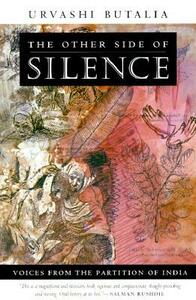You need to sign in or sign up before continuing.
Take a photo of a barcode or cover
adventurous
dark
emotional
informative
reflective
sad
tense
medium-paced
emotional
reflective
sad
slow-paced
dark
emotional
informative
reflective
sad
medium-paced
emotional
informative
sad
slow-paced
challenging
dark
emotional
informative
sad
tense
slow-paced
🌸💮🏵️ The Other Side of Silence 🏵️💮🌸
Know him as the brave one who fights against the enemy, lets his body be cut into a hundred pieces but never will he give up his faith.
The Other side of Silence by Urvashi Butalia is an attempt to bring out the side of the people who experienced partition of India and Pakistan alongwith several major incidents like the massacre of 1984 that made people across both the countries shiver with fear making them wonder how could a peaceful nation like ours be capable of showing such brutality and inhumane behaviour to their own people. This work attempts to bring out the voices of women, children and several other classes of society which were never heard only because of the lack of power and sometimes lack of medium.
To be frank, I jumped into this book without being mentally prepared for it. This was suggested to me by my close friend Naazi, and I thought it was a collection of stories based on the partition of India and Pakistan. Never had I thought that this book would be so heavy, full of emotions and the feelings of several people who were adversely affected by the division of our country. I was struggling a lot while going through this book because this was the first time I have read a book like this, so I won't say it's an easy-to-read book at all. Only dive in if you have prior experience reading memoirs and want to learn in depth about the situation that normal people were going through at the time of partition.
The book is primarily divided into eight sections, namely: beginnings, blood, facts, women, honour, children, margins, and memory. Each of these sections first presents to us how the writer got to know about them and then presents us with a few stories told by the survivors themselves. This book also emphasises whether bringing this harsh truth to light is right or not, whether people should be forced to tell what horrors they experienced, or should we let them stay silent and keep suffering internally. It also brings a major fact to the forefront: the violence caused in a peaceful community is always caused by some external forces or individuals who tend to pull out the dark side of ourselves in front by telling us facts that are straight out lies told just to make us rethink our beliefs and fight our own people, consequently destroying ourselves mentally and emotionally by inflicting damage on others physically.
The question still remains: why do people often forget that these kinds of situations are mostly created by external forces who clearly desire to destroy strong nations by introducing doubt in our minds, yet we continue to be manipulated by them, destroying everything that we have built over generations in just a few seconds?
Know him as the brave one who fights against the enemy, lets his body be cut into a hundred pieces but never will he give up his faith.
The Other side of Silence by Urvashi Butalia is an attempt to bring out the side of the people who experienced partition of India and Pakistan alongwith several major incidents like the massacre of 1984 that made people across both the countries shiver with fear making them wonder how could a peaceful nation like ours be capable of showing such brutality and inhumane behaviour to their own people. This work attempts to bring out the voices of women, children and several other classes of society which were never heard only because of the lack of power and sometimes lack of medium.
To be frank, I jumped into this book without being mentally prepared for it. This was suggested to me by my close friend Naazi, and I thought it was a collection of stories based on the partition of India and Pakistan. Never had I thought that this book would be so heavy, full of emotions and the feelings of several people who were adversely affected by the division of our country. I was struggling a lot while going through this book because this was the first time I have read a book like this, so I won't say it's an easy-to-read book at all. Only dive in if you have prior experience reading memoirs and want to learn in depth about the situation that normal people were going through at the time of partition.
The book is primarily divided into eight sections, namely: beginnings, blood, facts, women, honour, children, margins, and memory. Each of these sections first presents to us how the writer got to know about them and then presents us with a few stories told by the survivors themselves. This book also emphasises whether bringing this harsh truth to light is right or not, whether people should be forced to tell what horrors they experienced, or should we let them stay silent and keep suffering internally. It also brings a major fact to the forefront: the violence caused in a peaceful community is always caused by some external forces or individuals who tend to pull out the dark side of ourselves in front by telling us facts that are straight out lies told just to make us rethink our beliefs and fight our own people, consequently destroying ourselves mentally and emotionally by inflicting damage on others physically.
The question still remains: why do people often forget that these kinds of situations are mostly created by external forces who clearly desire to destroy strong nations by introducing doubt in our minds, yet we continue to be manipulated by them, destroying everything that we have built over generations in just a few seconds?
We know that the Partition of India caused one of the greatest mass migrations in the world. We know that it was accompanied by bloodshed on both sides. We have even heard stories of Partition from people who lived in those times, and have read some of the brilliant works of fiction set against the backdrop of Partition.
Yet, none of it prepared me for the stark reality depicted in Urvashi Butalia's book. Based on countless interviews patiently conducted over several years, Butalia goes beyond the predominant narratives, and looks at Partition from the people who we don't normally think about- the women, the children, the Dalits (and others living on the margins). In the main story which looks at Muslim, Hindu and Sikh men, these are voices that are never heard.
Some of the stories really shook me up, especially the ones on the "martyrdom" of the Sikh women- what was hardest to bear was reading how the men who presided over the murder of their women then proceeded to start new families of their own. Is a woman's body a battlefield? Does the honour of the family rest in her vagina? Why should a society think that it is better to be dead than to be "violated"?
Of the women abducted, Butalia says, "for the families, they (the abducted women) cease to exist after the abduction, but to the women, their (new) history starts from the point of abduction". When you decode the line, you are filled with rage- impotent rage.
The chapter on the people livng in the margins, similarly, makes you think. Of how the people who are invisible become visible the moment they disappear, because then the work the do remains undone.
I would call this book a 'must read', more so at a time like this when communal tensions are high.
Yet, none of it prepared me for the stark reality depicted in Urvashi Butalia's book. Based on countless interviews patiently conducted over several years, Butalia goes beyond the predominant narratives, and looks at Partition from the people who we don't normally think about- the women, the children, the Dalits (and others living on the margins). In the main story which looks at Muslim, Hindu and Sikh men, these are voices that are never heard.
Some of the stories really shook me up, especially the ones on the "martyrdom" of the Sikh women- what was hardest to bear was reading how the men who presided over the murder of their women then proceeded to start new families of their own. Is a woman's body a battlefield? Does the honour of the family rest in her vagina? Why should a society think that it is better to be dead than to be "violated"?
Of the women abducted, Butalia says, "for the families, they (the abducted women) cease to exist after the abduction, but to the women, their (new) history starts from the point of abduction". When you decode the line, you are filled with rage- impotent rage.
The chapter on the people livng in the margins, similarly, makes you think. Of how the people who are invisible become visible the moment they disappear, because then the work the do remains undone.
I would call this book a 'must read', more so at a time like this when communal tensions are high.
challenging
dark
emotional
informative
reflective
tense
medium-paced
adventurous
challenging
dark
emotional
informative
sad
tense
challenging
emotional
informative
reflective
tense
3.5 stars. The subject of the book is interesting, but I didn't like the writing style of the author. There is a lot of repitition and redundancy in the essays.



